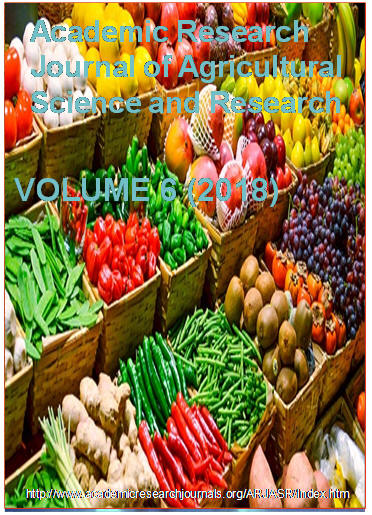| ARJASR |
Academic Research Journal of
Agricultural Science and Research |
|||||||||||||||||||
|
Vol. 6(8), pp. 509-519. October, 2018. ISSN: 2360-7874 DOI: 10.14662/ARJASRD2018.090 Full Length Research Genotype by Environment Interaction Analysis of Arabica Coffee Bean Yield Tarekegn Argaw1 and Girma Taye2
1Biometrician, Ethiopian Institute of Agricultural Research, P. O. Box 2003, Addis Ababa, Ethiopia 2Associate Professor, School of Public Health, Addis Ababa University, P. O. Box 9086, Addis Ababa, Ethiopia Corresponding authorís E-mail: tare.aragaw@gmail.com
Accepted 31 October 2018
Arabica Coffee is the most important and backbone of Ethiopian economy, which accounts for an average 60% of export earnings. Coffee is a perennial crop which can be harvested multiple times of years, and it is known to be affected with a characteristic biennial, which is more pronounced in the species Arabica coffee. The immediate objective of this study was to assess its Genotype by Environment interaction (GEI). The data for this study came from coffee variety field trials conducted by Jimma Agricultural Research Center (JARC) over 7 years during 2005-2011 in south west Ethiopia across 3 coffee growing areas (Jimma, Agaro, and Metu). The experimental design of the trial was RCBD with 4 replications and 17 Arabica coffee genotypes. Combined ANOVA and AMMI model were used for GEI analysis. All analyses were done with the help of R statistical package. The combined analysis of variance revealed that the genotype, environment, and GEI effects are highly significant (P-values<0.001). GEI accounted for 16.2% of the total sum of squares and was about 2 times larger than that of genotypes. The AMMI procedure revealed that AMMI-5 was the best truncated AMMI model that can sufficiently explain the information contained in GEI. The first three interaction principal components (IPC1, IPC2 and IPC3) retained by Gollobís F-test for graphical display accounted for 64.2% of GEI. The major factor that influence yield performance of Arabica coffee in Ethiopia is the environment, and among 17 Arabica coffee genotypes, G1, G2, G3, G7, G8, G9 and G12 have the best performance with G1, G2, G3, G8 and G12 being relatively stable across the test environments. It was recommended to use information from GEI analysis to investigate yield performance of Arabica coffee genotypes across environment.
Key Words: Arabica Coffee,GEI, AMMI
How to cite this article (APA Style): Argaw, T., Taye, G. (2018). Genotype by Environment Interaction Analysis of Arabica Coffee Bean Yield. Acad. Res. J. Agri. Sci. Res. 6(8): 509-519
|
|||||||||||||||||||
